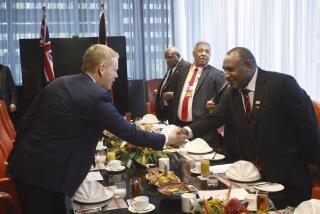U.S. Rejects Plea to Mend Its Ties With New Zealand : Opposition to Nuclear Arms Cited
- Share via
SYDNEY, Australia — The Bush Administration, reaffirming the U.S. strategy of nuclear deterrence, rebuffed an Australian call for a resumption of close political and military ties with New Zealand, senior officials of both countries said today.
Australian Foreign Minister Gareth Evans said it is time for Washington to consider repairing the relationship with New Zealand that was downgraded two years ago after the Wellington government refused to permit nuclear armed or nuclear-powered U.S. warships to call at New Zealand ports, an Australian official said.
But Secretary of State James A. Baker III and Defense Secretary Dick Cheney replied that nuclear deterrence remains a key element in U.S. policy despite the recent relaxation of superpower tensions.
A senior Bush Administration official said the breach was caused by New Zealand’s anti-nuclear policy.
“They made the decision on this issue,” the U.S. official said. “They will have to live with the result.”
New Zealand’s new prime minister, Jeffrey Palmer, has reaffirmed his nation’s anti-nuclear policy. But he complained that President Bush is prepared to meet Soviet President Mikhail S. Gorbachev while retaining a policy that prohibits high-level political and military contacts with New Zealand, one of Washington’s oldest traditional allies.
But a U.S. official said, “We live in an age where the United States plays an important role in terms of deterrent capabilities around the globe. Those in part depend on our ability to project force with our Navy. Our Navy relies in part on nuclear propulsion as well as nuclear weapons.”
For years, the U.S. government has expressed concern that a growing worldwide abhorrence of nuclear weapons might upset the global military balance which, officials argue, has prevented a new world war for almost 45 years.
The disagreement over New Zealand, combined with a somewhat similar rift over Washington’s continued coolness toward an Australian-backed South Pacific Nuclear Free Zone, marred otherwise harmonious U.S.-Australia security talks at a naval base in Sydney.
Baker, Cheney, Evans and Australian Defense Minister Kim Beazley attended the annual meeting to set policy for the alliance, which is still known as ANZUS (for Australia, New Zealand and the United States) despite New Zealand’s suspension in 1987.
Australian officials said they gained “the very strong impression” that the United States will abstain from a U.N. General Assembly vote endorsing the recently signed compact that prohibits the stationing of nuclear weapons in the South Pacific although it does not ban the passage through the region of nuclear-armed ships flying the flag of an outside nation.
“We like it,” one Australian official said of a U.S. abstention in the United Nations. “We like it a lot more than if they voted no.”
U.S. officials said, however, that no decision has been made concerning Washington’s position on the U.N. vote. But they left little doubt that the United States opposes creation of nuclear-free zones anywhere in the world.
More to Read
Sign up for Essential California
The most important California stories and recommendations in your inbox every morning.
You may occasionally receive promotional content from the Los Angeles Times.













